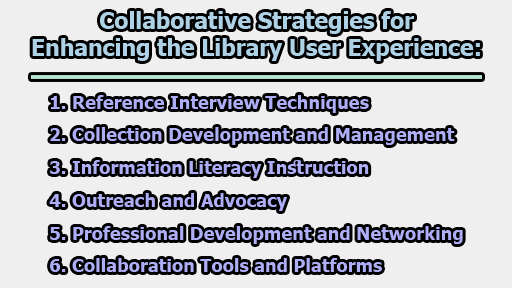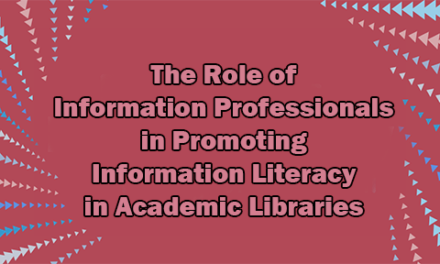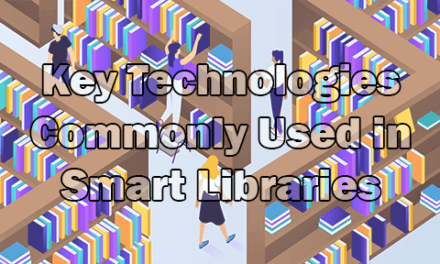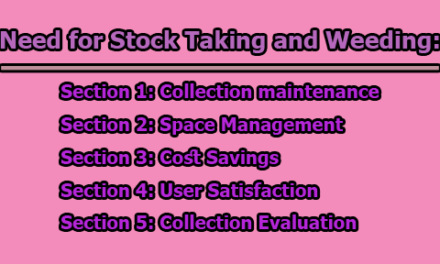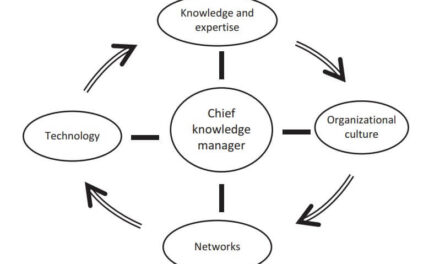Collaborative Strategies for Enhancing the Library User Experience:
Libraries have long been revered as essential hubs of knowledge and resources, serving as sanctuaries for curious minds and avid readers. In the digital age, their role has expanded beyond traditional book repositories to encompass a wide array of services and experiences. To provide users with the best possible library experience, library professionals must collaborate with a diverse set of professionals, both inside and outside the library. In this article, we’ll explore the collaborative strategies for enhancing the library user experience.
1. Reference Interview Techniques: One of the foundational skills of a library professional is conducting a reference interview. This is an essential component of understanding and addressing the information needs of library users. Effective reference interviews involve clear communication, active listening, and the use of open-ended questions. Moreover, professionals must remain mindful of ethical and legal considerations such as privacy, copyright, and diversity.
By applying these techniques, library professionals can help users find the information they need while establishing trust and rapport. Reference interviews are essential for ensuring that users receive personalized assistance, making the library experience more valuable and rewarding.
2. Collection Development and Management: The management of a library’s collection is a multifaceted task, encompassing the selection, acquisition, organization, preservation, and evaluation of materials. Collaborating with various professionals such as librarians, catalogers, archivists, vendors, and publishers is crucial for the success of this endeavor. The collection must cater to the diverse needs and preferences of users, adhere to the library’s budget and space constraints, maintain high-quality and relevant materials, and align with professional standards and policies.
Through collaboration, library professionals can ensure that their collections are diverse, accessible, and up-to-date, contributing to a rich and comprehensive library experience.
3. Information Literacy Instruction: Promoting information literacy is another vital aspect of library service. Information literacy instruction equips users with the skills and concepts necessary to find, evaluate, use, and create information effectively. To achieve this, library professionals must work in tandem with educators, trainers, and facilitators. This collaborative effort involves designing engaging learning activities, assessing and providing feedback on user learning outcomes, and utilizing appropriate tools and technologies for instruction.
Collaborating with other professionals in education allows library professionals to foster lifelong learning and critical thinking among their users, ultimately enriching the library experience.
4. Outreach and Advocacy: To elevate library services, library professionals must engage in outreach and advocacy. This involves promoting the library’s value and impact to various stakeholders, including the community, administration, media, and the public. Collaboration with marketers, communicators, fundraisers, and influencers is essential for the effective execution of these efforts.
Working together with these professionals allows library staff to articulate the library’s mission, vision, and goals, showcase its services, resources, and achievements, and solicit and respond to feedback and suggestions. By doing so, library professionals can increase awareness and garner support for their library, enhancing the overall library experience.
5. Professional Development and Networking: Continual professional development and networking are imperative for library professionals to stay current in their field. To achieve this, collaboration with mentors, coaches, peers, and experts is vital. Pursuing learning opportunities, such as courses, workshops, webinars, and conferences, is essential. Reflecting on and applying newfound knowledge to one’s practice, as well as sharing experiences and insights with others, fosters personal and collective growth.
Collaborating with fellow professionals enables library staff to grow and excel, ultimately benefiting library users through enhanced services and expertise.
6. Collaboration Tools and Platforms: In the digital age, the use of collaboration tools and platforms has become indispensable for efficient communication and cooperation among professionals, both within and outside the library. IT specialists, developers, and designers play a key role in selecting and implementing these tools. It’s important to choose tools that align with the library’s specific needs and preferences, whether they be email, chat, video, document, project, or social media platforms.
By effectively using collaboration tools and platforms, library professionals can streamline their work and enhance their interactions with other professionals, resulting in more efficient and effective library services.
In conclusion, collaboration with a diverse range of professionals is essential for library professionals striving to provide users with the best library experience possible. The six key areas discussed – reference interview techniques, collection development and management, information literacy instruction, outreach and advocacy, professional development and networking, and collaboration tools and platforms – are all vital components of a holistic approach to library service. By working in tandem with experts in these fields, library professionals can ensure that their services are enriched, diverse, and tailored to meet the unique needs and preferences of their users. Ultimately, these collaborative efforts create a library experience that is engaging, informative, and rewarding, fostering a community of lifelong learners and knowledge seekers.

Library Lecturer at Nurul Amin Degree College

